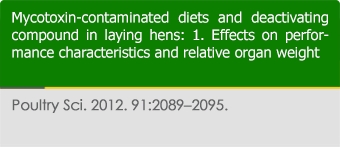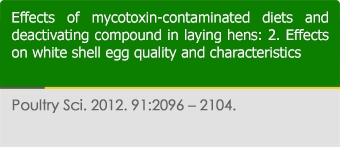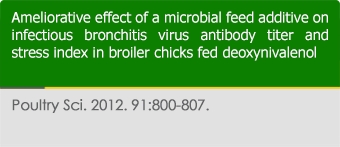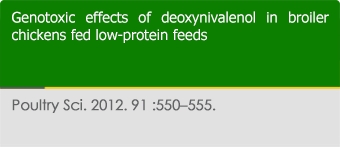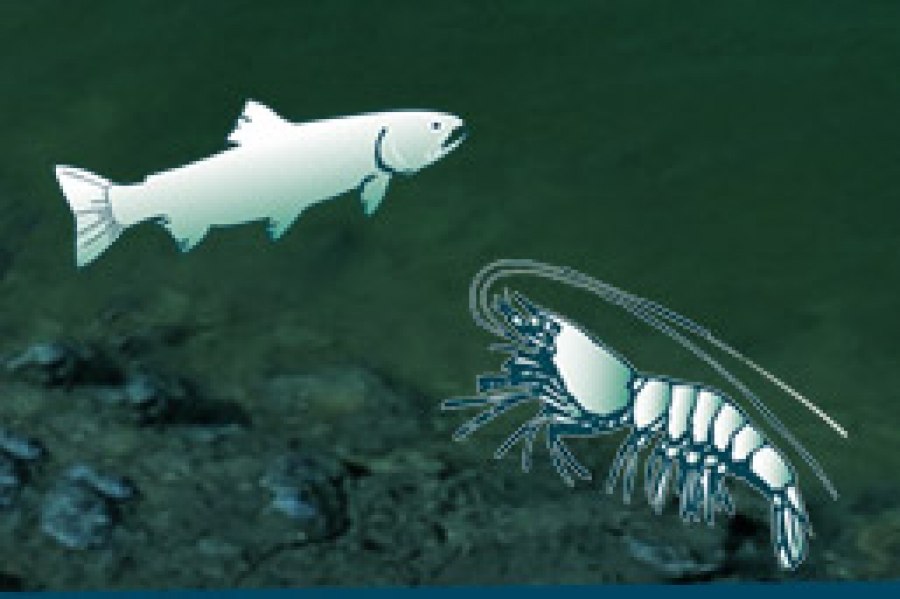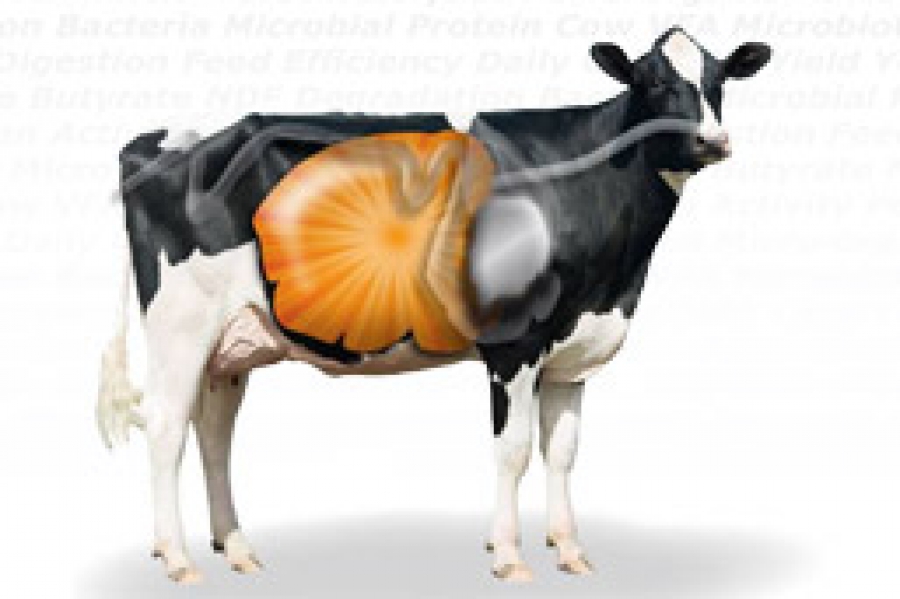Lee, J. T., K. A. Jessen, R. Beltran, V. Starkl, G. Schatzmayr, R. Borutova, and D. J. Caldwell
The current experiment was conducted to determine the effect of mycotoxin-contaminated diets with aflatoxin (AFLA) and deoxynivalenol (DON) and dietary inclusion of deactivation compound on layer hen performance during a 10-wk trial. The experimental design consisted of a 4 × 2 factorial with 4 toxin levels: control, low (0.5 mg/kg AFLA + 1.0 mg/kg DON), medium (1.5 mg/kg AFLA + 1.5 mg/kg DON), and high (2.0 mg/kg AFLA + 2.0 mg/kg DON) with or without the inclusion of deactivation compound. Three hundred eighty-four 25-wk-old laying hens were randomly assigned to 1 of the 8 treatment groups. Birds were fed contaminated diets for a 6-wk phase of toxin administration followed by a 4-wk recovery phase, when all birds were fed mycotoxin-free diets.
Lee, J. T., K. A. Jessen, R. Beltran, V. Starkl, G. Schatzmayr, R. Borutova, and D. J. Caldwell
An experiment was conducted to determine the effect of dietary inclusion of Mycofix Select (Biomin GmbH, Herzogenburg, Austria) on discrete egg parameters and quality characteristics of hens fed mycotoxin-contaminated diets (aflatoxin; AFLA) and deoxynivalenol (DON)) during a 10-wk trial. A 4 × 2 factorial design was used with 4 contamination levels: control, low (0.5 mg/kg of AFLA + 1.0 mg/kg of DON), medium (1.5 mg/kg of AFLA + 1.5 mg/kg of DON), and high (2.0 mg/kg of AFLA + 2.0 mg/kg of DON) with or without the inclusion of mycotoxin deactivating compound. Three hundred and eighty-four 25-wk-old laying hens were housed 3 per cage. Birds were fed contaminated diets for a 6-wk phase of toxin administration followed by a 4-wk recovery phase, when all birds were fed mycotoxin-free diets.
Ghareeb, K., W. A. Awad , and J. Böhm
Although acute mycotoxicoses are rare in poultry production, chronic exposure to low levels of mycotoxins is responsible for reduced productivity and increased susceptibility to infectious diseases. Deoxynivalenol (DON) is known to modulate immune function, but only a few studies have investigated the effect of DON on the vaccinal immune response. In addition, the effects of Mycofix select (Biomin GmbH, Herzogenburg, Austria) supplementation to DON-contaminated broiler diets have not yet been demonstrated. Therefore, an experiment with 1-d-old male broilers (Ross 308) was carried out to examine the effects of feeding DON-contaminated low-protein grower diets on performance, serum biochemical parameters, lymphoid organ weight, and antibody titers to infectious bronchitis vaccination in serum and to evaluate
Awad, W. A., K. Ghareeb, A. Dadak, L. Gille, K. Staniek, M. Hess, and J. Böhm
Deoxynivalenol (DON) is one of the most abundant and important trichothecenes in food and feed, and it is a significant contaminant due to its frequent occurrence at toxicologically relevant concentrations worldwide. Deoxynivalenol has negative influences on the health and performance of chicks. However, there is little information available regarding the effect of DON on DNA fragmentation in blood lymphocytes. In addition, the effects of Mycofix select (Biomin GmbH, Herzogenburg, Austria) supplementation to DON-contaminated broiler diets on lymphocyte DNA have not yet been demonstrated. Therefore, the aim of the present study was to establish the effect of DON on lipid peroxidation and lymphocyte DNA fragmentation in broilers and to evaluate the potential of Mycofix select in the prevention of toxin-mediated changes.



